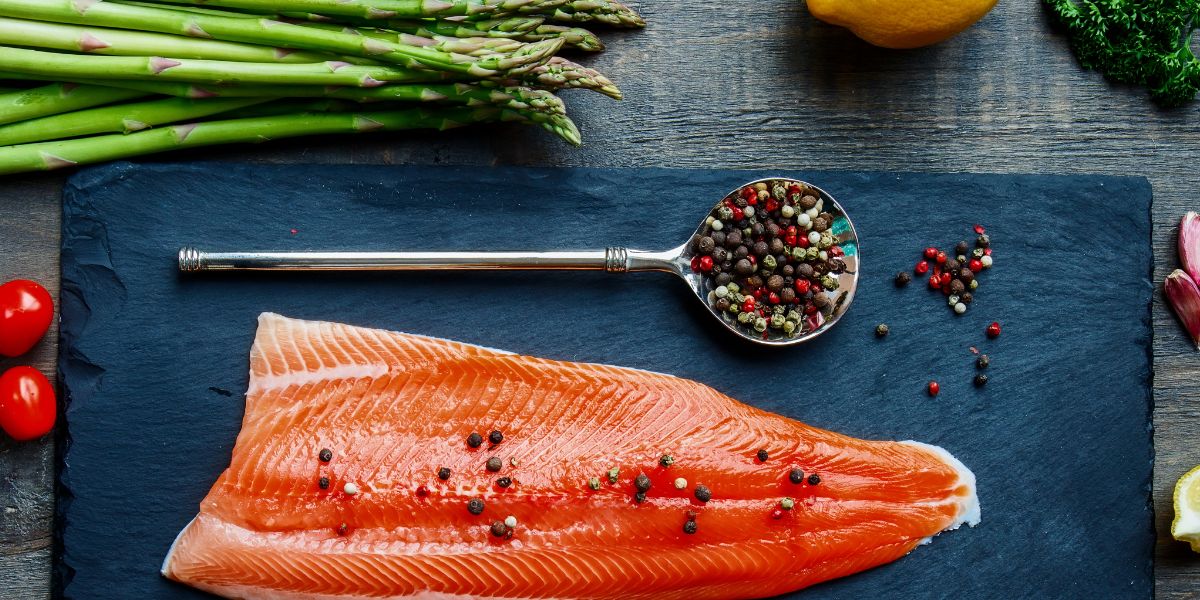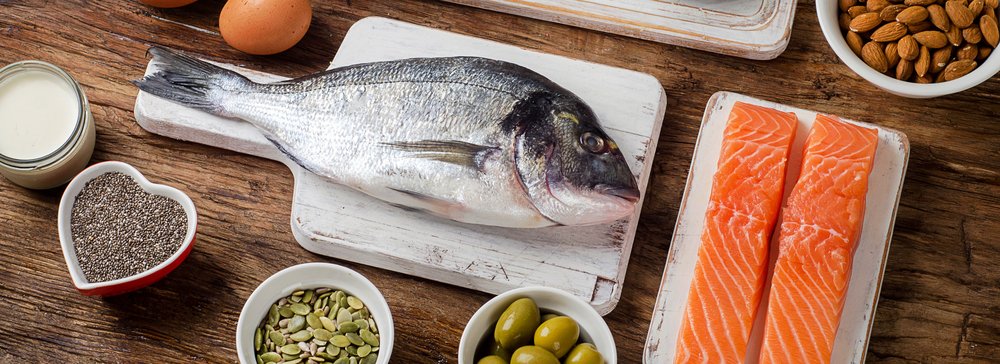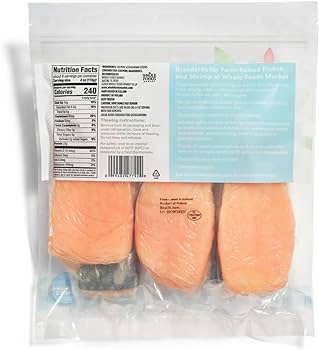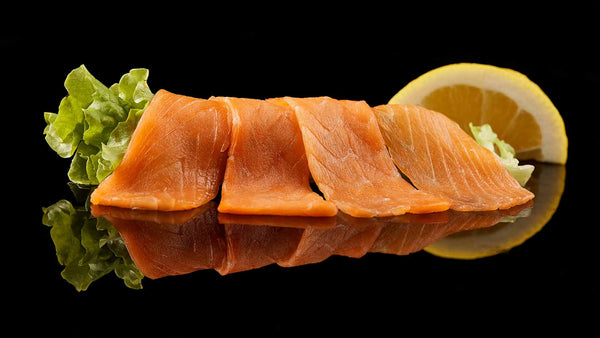Are you curious about the health benefits of frozen salmon? Is frozen salmon healthy? In a world where nutritional choices can feel overwhelming, understanding the value of your food is crucial. Frozen salmon is not only convenient but also a powerhouse of essential nutrients like omega-3 fatty acids, protein, and vitamins.
Let’s dive into the facts and evaluate the nutritional value of frozen salmon to uncover why it can be a smart addition to your diet.
Frozen Salmon: A Nutritional Powerhouse

Frozen salmon is a fantastic addition to any diet! Packed with essential nutrients, it offers a variety of health benefits.
Rich in Nutrients:
Frozen salmon is a source of high-quality protein, which is crucial for building and repairing muscles. It also contains omega-3 fatty acids, which promote heart health and brain function.
But that’s not all! Frozen salmon is a treasure trove of vitamins and minerals. Vitamin D and B vitamins contribute to overall well-being, while selenium and potassium support various bodily functions.
Convenience with Benefits:
The freezing process has minimal impact on the protein, fat, or fat-soluble vitamins in salmon. This means you get all the goodness with the added benefit of convenience. Frozen salmon is readily available, making it easy to incorporate into your meals regularly and reap its health rewards.
Boost Your Health:
By including frozen salmon in your diet, you can:
- Improve your overall nutrition
- Support healthy heart function
- Enhance brain function
- Promote muscle growth and repair
- Maintain a balanced lifestyle
So, next time you’re looking for a nutritious and convenient meal option, consider grabbing some frozen salmon. Your body will thank you for it!
Frozen Salmon: A Great Source of Omega-3 Fatty Acids

Frozen salmon is a convenient and delicious way to get the essential omega-3 fatty acids your body needs. Omega-3s are fats that our bodies can’t produce on their own, but they play a vital role in maintaining good health.
Why Omega-3s Matter
Omega-3s offer a variety of health benefits. They can help reduce inflammation, improve heart health by lowering blood pressure and reducing the risk of heart disease, and even support brain function and mental well-being.
Omega-3s in Frozen Salmon
The good news is that frozen salmon is a great source of omega-3s, including two important types: docosahexaenoic acid (DHA) and eicosapentaenoic acid (EPA). These fatty acids can help reduce inflammation, lower your risk of heart disease, and keep your brain functioning well. Whether you choose wild-caught or farmed salmon, you’ll be getting a healthy dose of these essential fats.
By incorporating frozen salmon into your diet, you can ensure you’re getting enough omega-3s to promote overall health and well-being.
Frozen Salmon: A Great Source of Protein

Frozen salmon is a nutritious and convenient way to boost your protein intake. A single 3.5-ounce serving packs a whopping 22 grams of protein, making it a great choice for people looking to meet their daily needs.
Why Protein Matters
Protein is a building block for our bodies. It’s essential for building and repairing tissues, supporting a healthy immune system, and keeping hair and nails strong. Getting enough protein also helps you feel satisfied after eating, which can be beneficial for weight management.
Benefits of Frozen Salmon
Frozen salmon is an excellent source of high-quality protein. It’s delicious and versatile, allowing you to enjoy it grilled, baked, or poached. Including frozen salmon in your diet is a simple way to get the protein you need while reaping a variety of health benefits.
The Importance of Protein in Your Diet
Protein plays a critical role in maintaining good health. It helps build and maintain muscle mass, supports a healthy weight, and keeps your body functioning optimally. Protein is also broken down into amino acids, which are essential building blocks for enzymes, hormones, and other important molecules. By incorporating high-quality protein sources like frozen salmon into your meals, you can ensure your body gets the protein it needs to thrive.
Vitamins And Minerals In Frozen Salmon
Frozen salmon is a fantastic addition to your diet because it’s packed with vitamins and minerals that benefit your overall health.
Rich in B Vitamins: Frozen salmon is especially high in B vitamins, including B12. Vitamin B12 is crucial for healthy nerves and red blood cell production.
Vitamin D for Strong Bones and Immunity: This delicious fish is also a good source of vitamin D, which helps maintain strong bones and a healthy immune system.
Essential Minerals: Beyond vitamins, frozen salmon boasts a variety of minerals that play important roles in your body. These include selenium, potassium, and phosphorus.
Meeting Your Nutritional Needs: By incorporating frozen salmon into your meals, you’re ensuring you get the essential vitamins and minerals your body needs for optimal health. This contributes to a well-balanced and nutritious diet.
Frozen vs. Fresh Salmon: What’s the Difference?

When deciding between frozen and fresh salmon, there are a few key factors to consider. Both options offer similar health benefits, but there are some key differences in terms of convenience, price, and availability.
Nutrition:
While both types of salmon are packed with nutrients, fresh salmon might have a slight edge in omega-3 fatty acids. This is because freezing can cause a small amount of omega-3s to degrade. However, the difference is minimal, and both frozen and fresh salmon are excellent sources of protein and vitamins.
Fresh vs. Frozen: Making the Choice
Here are some things to keep in mind when choosing between fresh and frozen salmon:
- Availability: Fresh salmon has a shorter season and may not always be readily available. Frozen salmon, on the other hand, is available year-round.
- Convenience: Frozen salmon is the clear winner here. It’s always on hand in your freezer, perfect for those last-minute meals. Fresh salmon requires more planning for grocery shopping and meal preparation.
- Price: Frozen salmon is generally more affordable than fresh salmon, making it a budget-friendly option.
- Sustainability: Look for certifications that indicate sustainable fishing practices when choosing both fresh and frozen salmon. This helps ensure the health of our oceans for future generations.
Ultimately, the best choice for you depends on your priorities. If you value convenience and affordability, frozen salmon is a great option. If you have access to fresh, seasonal salmon and prioritize the absolute highest omega-3 content, then fresh might be the better choice. No matter which you choose, you’re getting a delicious and nutritious fish that can be enjoyed in many ways.
Conclusion
Frozen salmon is a healthy and nutritious addition to your diet. It’s packed with omega-3 fatty acids, protein, vitamins, and minerals. Freezing preserves these nutrients, making frozen salmon a convenient and year-round option.
Fresh or frozen, salmon offers the same health benefits when included in a balanced diet. Choose based on availability, convenience, price, and sustainability. Remember to check if the salmon is sustainably sourced to make an eco-friendly decision.
Health Benefits of Frozen Salmon
Frozen salmon boasts numerous health benefits due to its rich nutrient content. It’s loaded with omega-3 fatty acids, which are important for heart health, reducing inflammation, and supporting brain function. The protein in frozen salmon helps with muscle repair and growth. Additionally, it’s rich in vitamins and minerals that contribute to overall health and well-being. Including this nutritious fish in your diet, whether frozen or fresh, is a great way to support a balanced and healthy lifestyle.
Tips for Including Frozen Salmon in Your Diet
For a balanced diet, aim to consume frozen salmon at least twice a week to ensure adequate intake of omega-3s, protein, vitamins, and minerals. Here are some tips:
- Thawing: Thaw frozen salmon overnight in the refrigerator to preserve its texture and flavor.
- Cooking: Opt for healthy cooking methods like grilling, baking, or steaming to retain the nutritional value.
- Sides: Pair frozen salmon with colorful vegetables, whole grains, and legumes for a well-rounded meal.
- Flavor: Experiment with marinades, spices, and herbs to add exciting flavors to your frozen salmon.
By incorporating frozen salmon into your diet, you can enjoy a delicious and nutritious choice that contributes to a balanced and healthy lifestyle.
References:
FAQ About Is Frozen Salmon Healthy: Evaluating Nutritional Value
Q: What are the nutritional benefits of frozen salmon?
A: Frozen salmon is packed with essential nutrients like omega-3 fatty acids, protein, vitamin D, and minerals such as selenium and potassium, which are beneficial for heart health, brain function, and overall well-being.
Q: Does freezing affect the omega-3 content of salmon?
A: Freezing can slightly reduce salmon’s omega-3 fatty acid content. However, frozen salmon remains a good source of omega-3s compared to many other foods.
Q: Is frozen salmon lower in nutritional value compared to fresh salmon?
A: While fresh salmon may have a slightly higher nutritional value than frozen salmon due to minimal processing, the difference is typically minimal. Frozen salmon still retains most of its nutrients and is a convenient and budget-friendly option.
Q: How should frozen salmon be prepared to preserve its nutritional value?
A: To preserve the nutritional value of frozen salmon, it is recommended to cook it using gentle methods such as baking, steaming, or grilling. Avoid deep-frying or highly processed cooking techniques that may reduce the nutrient content.
Q: Are there any risks associated with consuming frozen salmon?
A: Generally, frozen salmon is considered safe to consume. However, it is essential to ensure that the salmon is properly thawed and cooked to the recommended internal temperature to reduce the risk of foodborne illnesses.
Q: Can frozen salmon be as nutritious as fresh salmon?
A: While fresh salmon is often preferred for its taste and texture, frozen salmon can be just as nutritious when handled and cooked properly. It remains a convenient option for incorporating healthy omega-3 fats and other nutrients into your diet.

Welcome to Braddock Bay Tavern & Grill, where history, delicious cuisine, and stunning views come together to create an unforgettable experience. Our restaurant, situated on the picturesque edge of Lake Ontario, has a rich history that adds a unique charm to your dining experience. The roots of our establishment can be traced back to 1865, when it was first constructed as an icehouse. Over the years, it transformed into the historic Braddock Bay Hotel, becoming a beloved local landmark. Today, we take pride in preserving the building’s historical beauty, ensuring that every visit to our restaurant is a journey through time.